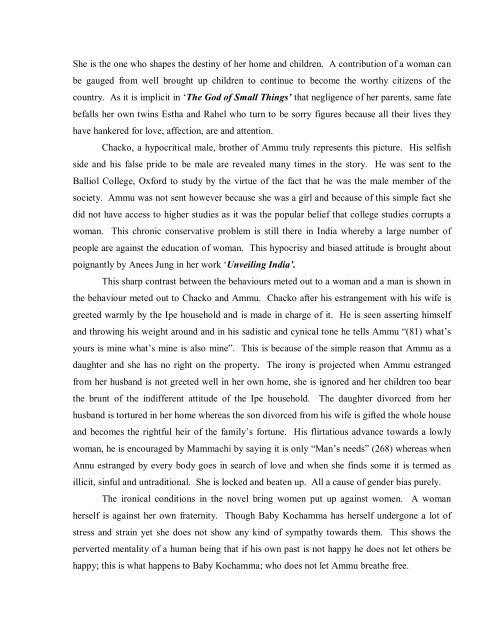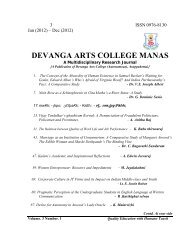A Multidisciplinary Research Journal - Devanga Arts College
A Multidisciplinary Research Journal - Devanga Arts College
A Multidisciplinary Research Journal - Devanga Arts College
You also want an ePaper? Increase the reach of your titles
YUMPU automatically turns print PDFs into web optimized ePapers that Google loves.
She is the one who shapes the destiny of her home and children. A contribution of a woman can<br />
be gauged from well brought up children to continue to become the worthy citizens of the<br />
country. As it is implicit in ‘The God of Small Things’ that negligence of her parents, same fate<br />
befalls her own twins Estha and Rahel who turn to be sorry figures because all their lives they<br />
have hankered for love, affection, are and attention.<br />
Chacko, a hypocritical male, brother of Ammu truly represents this picture. His selfish<br />
side and his false pride to be male are revealed many times in the story. He was sent to the<br />
Balliol <strong>College</strong>, Oxford to study by the virtue of the fact that he was the male member of the<br />
society. Ammu was not sent however because she was a girl and because of this simple fact she<br />
did not have access to higher studies as it was the popular belief that college studies corrupts a<br />
woman. This chronic conservative problem is still there in India whereby a large number of<br />
people are against the education of woman. This hypocrisy and biased attitude is brought about<br />
poignantly by Anees Jung in her work ‘Unveiling India’.<br />
This sharp contrast between the behaviours meted out to a woman and a man is shown in<br />
the behaviour meted out to Chacko and Ammu. Chacko after his estrangement with his wife is<br />
greeted warmly by the Ipe household and is made in charge of it. He is seen asserting himself<br />
and throwing his weight around and in his sadistic and cynical tone he tells Ammu “(81) what’s<br />
yours is mine what’s mine is also mine”. This is because of the simple reason that Ammu as a<br />
daughter and she has no right on the property. The irony is projected when Ammu estranged<br />
from her husband is not greeted well in her own home, she is ignored and her children too bear<br />
the brunt of the indifferent attitude of the Ipe household. The daughter divorced from her<br />
husband is tortured in her home whereas the son divorced from his wife is gifted the whole house<br />
and becomes the rightful heir of the family’s fortune. His flirtatious advance towards a lowly<br />
woman, he is encouraged by Mammachi by saying it is only “Man’s needs” (268) whereas when<br />
Annu estranged by every body goes in search of love and when she finds some it is termed as<br />
illicit, sinful and untraditional. She is locked and beaten up. All a cause of gender bias purely.<br />
The ironical conditions in the novel bring women put up against women. A woman<br />
herself is against her own fraternity. Though Baby Kochamma has herself undergone a lot of<br />
stress and strain yet she does not show any kind of sympathy towards them. This shows the<br />
perverted mentality of a human being that if his own past is not happy he does not let others be<br />
happy; this is what happens to Baby Kochamma; who does not let Ammu breathe free.



